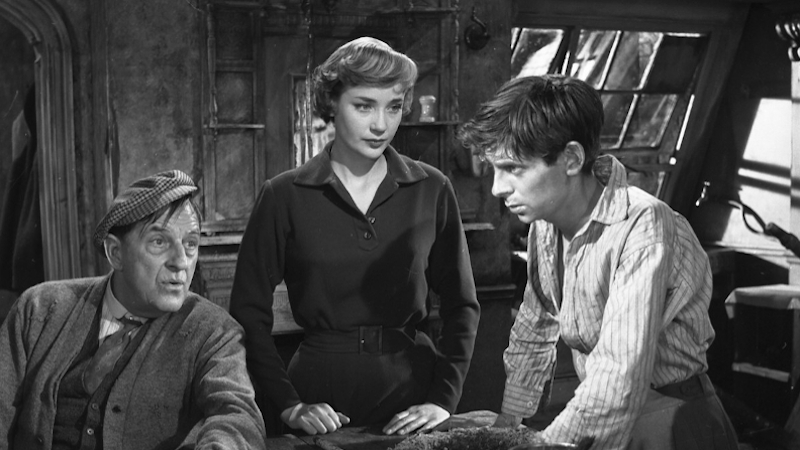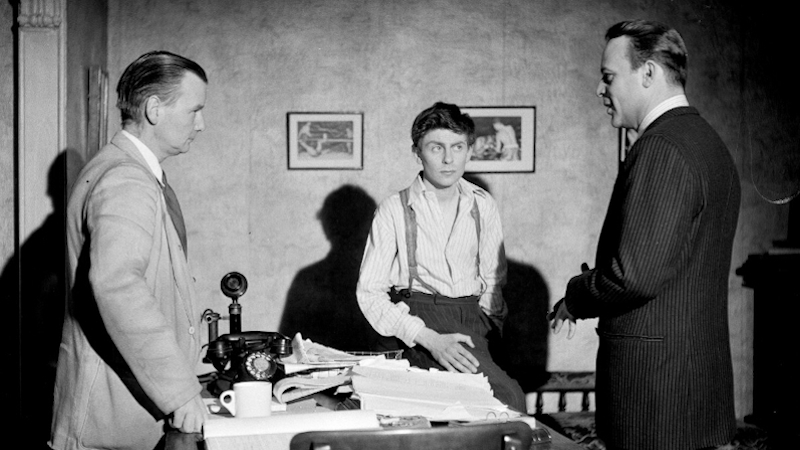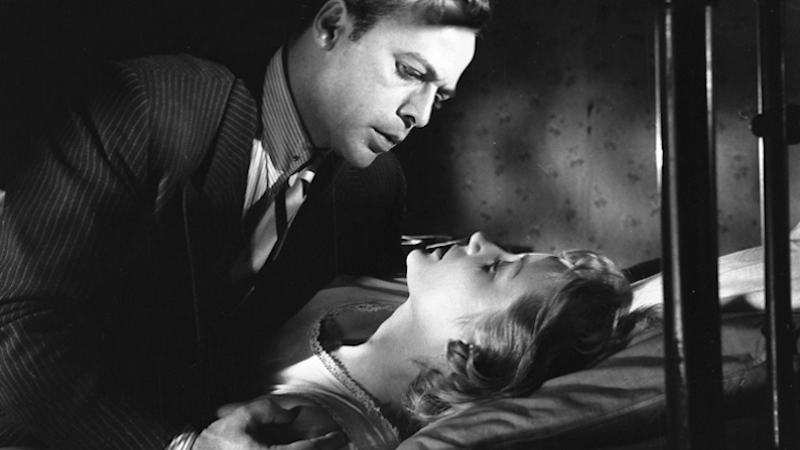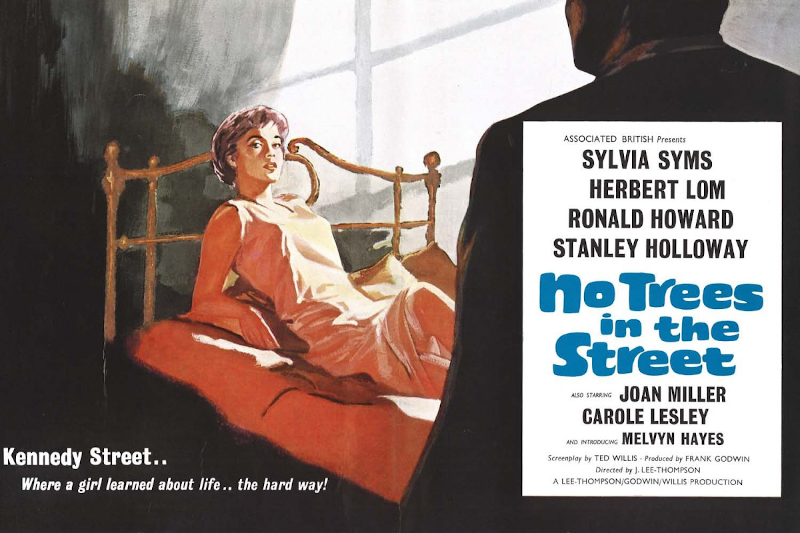Director – J. Lee Thompson – 1959 – UK – Cert. 12 – 96m
****
An essentially honest young woman living in her parents’ East End slum fails to stop her impetuous younger brother from becoming involved in the criminal underworld – one of two J. Lee Thompson movies out on UK Blu-ray, DVD and Digital
Framed by a contemporary story of plain clothes policeman Frank (Ronald Howard) trying to talk sense into a knife-carrying teenager (David Hemmings), this takes place in the East End street where the latter lives some 20 years previously. The name has changed: back then, Somerset Street was known as Kennedy Street. The policeman, who is local, has always worked this beat. 20 years ago, he was trying to prevent another young man from drifting into a life of crime.

That other young man is Tommy (Melvyn Hayes), who lives with his father, mother and older sister Hetty (Sylvia Syms) in fairly basic accommodation. It’s a poor area and honest work is hard to come by. Both brother and sister would like to find a way out, into a better life. Both have less than honest ways of doing so, in the form of local ‘businessman’ Wilkie (Herbert Lom).
Tommy, whose idea of doing a job is to take as much from it for himself as he can – for instance by stealing tools and selling them – goes to see Wilkie for a job, something his father encourages but which Hetty warns against. Hetty is the object of Wilkie’s affection, but disliking how he makes his money, she wants nothing to do with him – although, that said, she may feel a certain attraction towards him, which her better self fights to resist.

Tommy was Melvyn Hayes’ first starring role, and he really gets into the meat of the tormented teenager; he would go on to play alongside Cliff Richard in Summer Holiday (Peter Yates, 1961) and become a household name in It Ain’t Half Hot, Mum (TV series, 1974-81). He’s also featured in a worthwhile disc extra talking about his memories of working on the film.
Hetty is likewise fascinating, the character torn between two opposing directions. Her being a model good girl is made all the more interesting by all the pressure on her, including from her mother, to simply throw in her lot with Wilkie. Indeed, her mother engineers a situation where Hetty is in bed and Wilkie is the only other person on the premises. Hetty may make bad decisions, but you wonder whether, in her position, you’d have done exactly the same.
Sylvia Syms was a regular in J. Lee Thompson’s films of the 1950s and 1960s, picking up BAFTA Best Actress nominations for both Woman in a Dressing Gown (1957) and this one, as well as one for supporting actress on The Tamarind Seed (Blake Edwards, 1974).

Wilkie is another fascinating character. Lom plays him as a smooth operator who refuses to forget his own, poverty-stricken roots. He lists the things he wants and then proceeds to take them: but that doesn’t happen when he wants Hetty, because she makes it plain she’s not interested, and he experiences defeat.
Herbert Lom is perhaps best known for his comedy roles: he’s memorable as a gangster in late Ealing Comedy The Ladykillers (Alexander Mackendrick, 1955) as well as his recurring role in the Pink Panther franchise opposite Peter Sellers. But here he shows himself extremely capable in a non-comedy role, which may rank among his finest onscreen achievements.
Fitting neatly into a long tradition of British cinema, the film is thus essentially three character studies – the troubled youth, the elder sister, the smooth-talking criminal – with a group of further quirky characters thrown in. These include: the siblings’ pragmatic mother (Joan Miller) and blind father (Liam Redmond) who seem to condone crime as long as there’s no chance anyone gets caught, faded music hall performer Kipper (Stanley Holloway from Ealing Comedy The Lavender Hill Mob, Charles Crichton, 1951), woman with an abusive husband Marge (Lana Morris)

and gangland girl Lova (Carole Lesley) from Wilkie’s entourage. Frank the plain clothes policeman, whose role seems to be both a second romantic interest for Hetty and the person who directs potential young offenders towards the straight and narrow, isn’t really given any room to develop as a character; perhaps because he’s essentially one-dimensional and boring.
Made by the Lee-Thompson Godwin/Willis production company, it fits into a further British tradition of screenplay by writers who cut their teeth on other media, in this case, writer Ted Willis from the theatre. You can tell, because much of the proceedings take place in and around the family flat, with the neighbours from the adjoining flats dropping in and out. The street itself plays a major role, a specially constructed set at Elstree Studios and there are a few other scenes, notably when Tommy is given a job by Wilkie involving unloading a van and making sure that the sleeping driver never wakes up.

The opening cleverly deploys some remarkable aerial photography and a sequence of a character seen from the air as they run over an area of waste ground, suggesting that what follows will be fully of epic compositions. Yet, curiously, as it settles into what one might describe as kitchen sink realism, with its small number of small, cramped sets, the audience never feels short-changed, possibly because the script keeps probing and exploring both its lead and subsidiary characters to maintain its grip on the viewer.
It had the misfortune to be a British social picture made in a studio at the same time as the non-studio bound, kitchen sink realism of films such as Room at the Top (Jack Clayton, 1959) and Saturday Night and Sunday Morning (Karel Reisz, 1960), not to mention the French New Wave films such as Breathless (Jean-Luc Godard, 1960) which made a virtue out of shooting movies on the streets. Such contemporary works have eclipsed the film’s place in film history, rendering it less well-known than it might otherwise have been. Yet, viewed in hindsight today, it plays as a striking work well worth tracking down.
No Trees in the Street is one of two J. Lee Thompson movies out on Blu-ray, DVD and Digital in the UK.
Trailer:
Vintage Classics Website:
